
Podcast: Sieben weise Meister to go
emanated from the project seminar “Kreative Literaturvermittlung” (2022/23)
Political power struggles, charming seduction attempts and a week full of death sentences - what sounds like the inventory of a contemporary mainstream series already has its place for over 800 years in the story collection of the Seven Sages of Rome in the literature of the Middle Ages. But what does this medieval bestseller have to do with modern series? What motifs familiar to world literature can be found in the exemplary stories? And what can storytelling do about an impending death? Emerging from a scientific teaching project by Prof. Dr. Bent Gebert and Dr. Nico Kunkel in cooperation with students at the University of Konstanz in the winter semester 2022/23, the podcast series invites you to engage with these and other exciting questions - and discusses under which aspects the Seven Sages of Rome can still fascinate today beyond the university.
Note: The episodes linked below can also be found in many popular podcast portals (e.g. Spotify, Google Podcasts, Apple Podcasts, Amazon Music)!
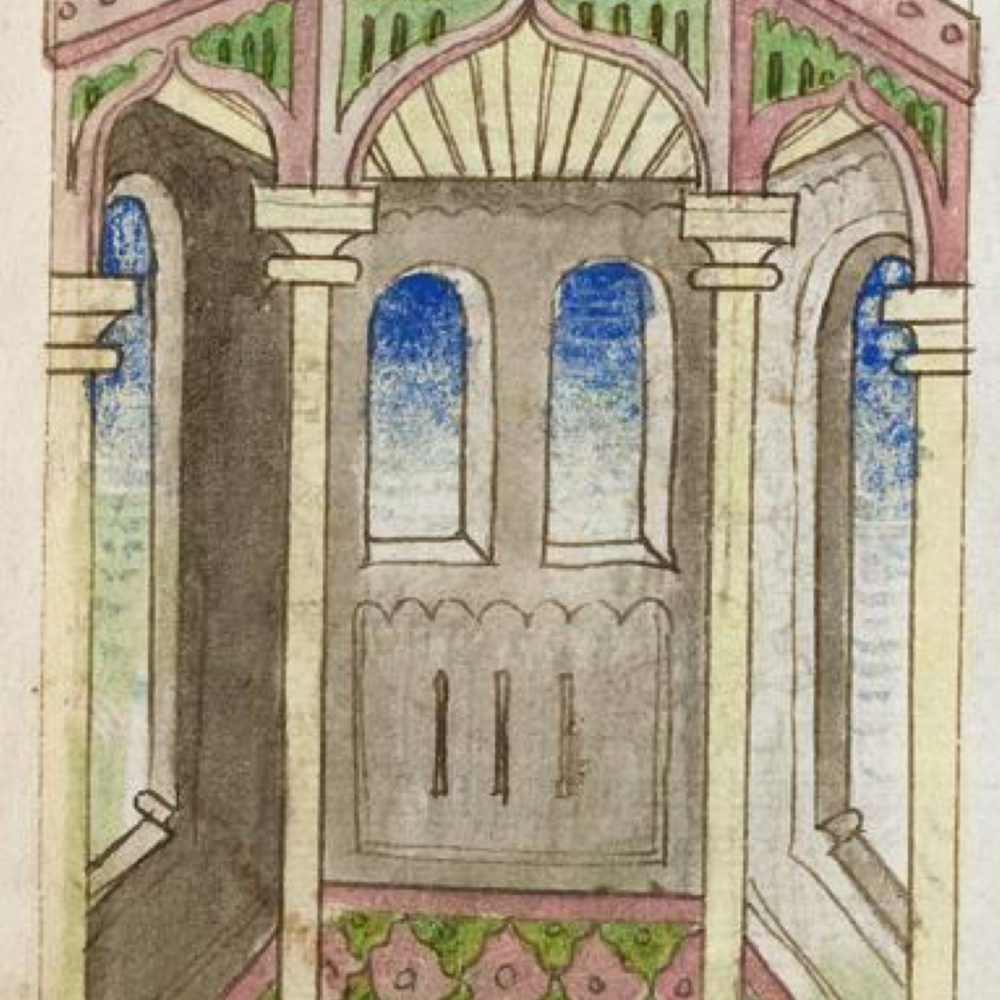
Podcast Preface (Click to downoad)
How to talk about medieval storytelling in a podcast series and why the storytelling tradition of the Seven Sages of Romeis particularly suited to this format is revealed in the preface to the podcast.
We read and discuss on the basis of the following primary text edition (Colmarer Fs.):
Roth, Detlef (Hg.): Sieben weise Meister. Eine bairische und eine elsässische Fassung der "Historia septem sapientum", Berlin 2008 (Texte des späten Mittelalters und der frühen Neuzeit 44).

Episode 1: How it all begins (Click to download)
In this episode, Prof. Dr. Bent Gebert and Dr. Nico Kunkel approach the medieval storytelling tradition of the Seven Sages of Rome and talk about the first part of the frame narrative that lays the foundation for the seven-day storytelling competition between the empress and the sages.
Consulted Research Literature
– Hagedorn, Roger: "Doubtless to be continued. A brief history of serial narrative", in: To be continued… Soap Operas Around the World, hg. von Robert C. Allen, London 1995, S. 27-48.
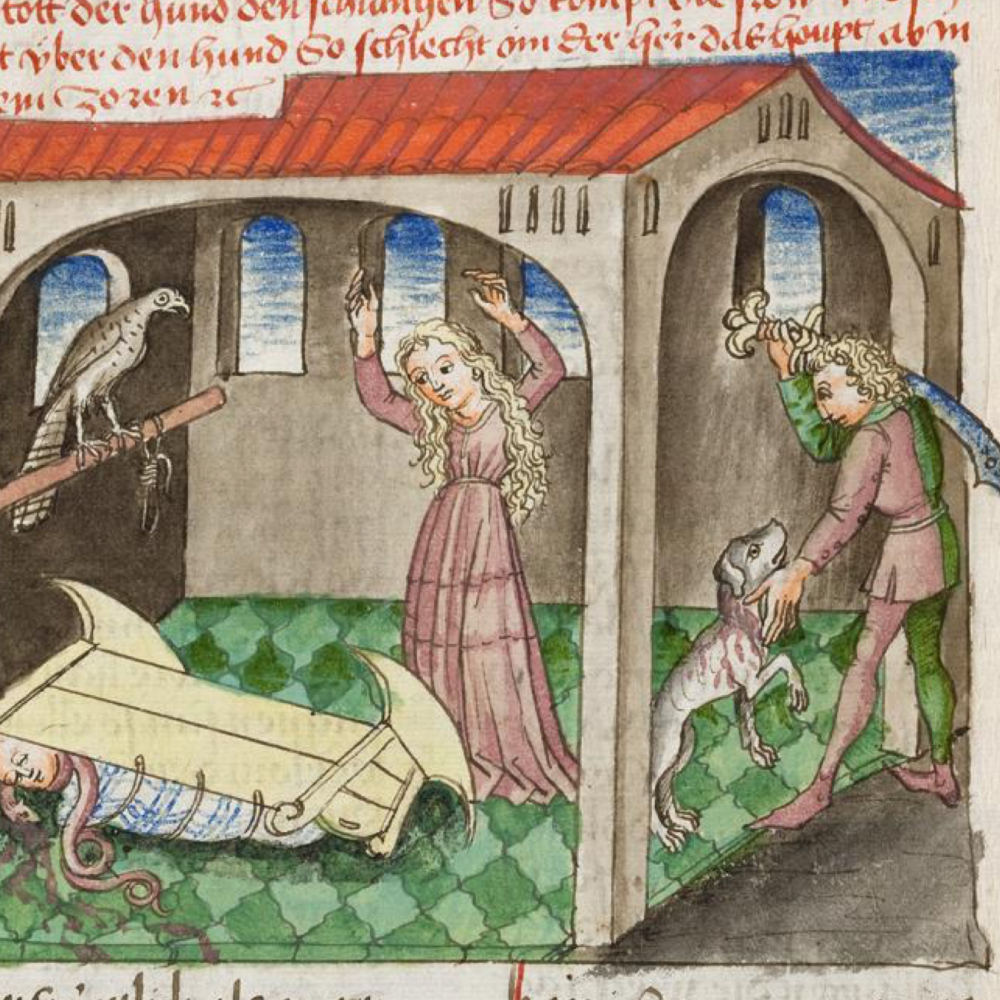
Episode 2: Story Day I (Arbor, Canis) (Click to download)
Today we are talking about Arbor and Canis - a tree that won’t grow and that is man’s not-so-best friend at first glance. We also ask the question: who seems more convincing in the narrative battle for the emperor’s favor - the empress or the sage? And can we find similar narratives and characters in the current media world as in the long-gone bestseller? We hope you enjoy listening!
Speakers: Marie Puschmann, Nina Schmitt, Stefanie Wallintin
Consulted Research Literature
– Gerdes, Udo: „Sieben weise Meister“, in: Die deutsche Literatur des Mittelalters. „ Verfasserlexikon, hg. von Kurt Ruh, 2. Aufl., Bd. 8, Berlin/New York 1992, Sp. 1174-1189.
— Obermaier, Sabine: „Die zyklische Rahmenerzählung orientalischer Provenienz als Medium der Reflexion didaktischen Erzählens im deutschsprachigen Spätmittelalter“, in: Didaktisches Erzählen. Formen literarischer Belehrung in Orient und Okzident, hg. von Regula Forster, Frankfurt am Main/Berlin/Bern/Bruxelles/New York/Oxford/Wien 2010, S. 189-205.
– Steinmetz, Ralf-Henning: Exempel und Auslegung. Studien zu den „Sieben weisen Meistern“, Freiburg, Schweiz 2000.
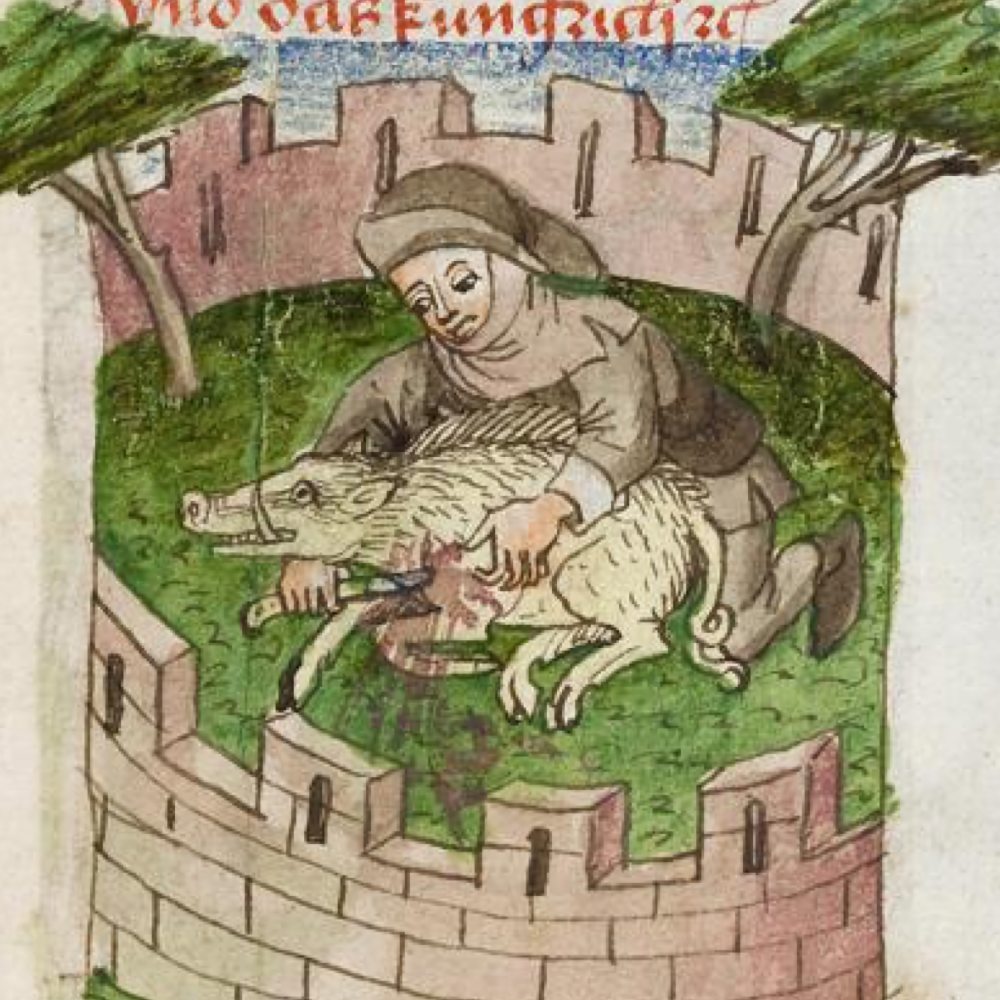
Episode 3: Story Day II (Aper, Puteus) (Click to download)
It is Day 2 and a new narrative repartee between the empress and the sages is upon us. While invincible boars, anxious old husbands, and faithless wives are reported, the first serial elements and recurring patterns can be discerned.
Speakers: Patrick Silberling, Michael Winkler
Consulted Research Literature
– Roth, Detlef: "Die ‚Historia septem sapientum‘ als geistlicher Erbauungstext", in: Mittellateinisches Jahrbuch 38 (2003), S. 357-378.
– Roth, Detlef: "Narrative Exempelkritik? Zu Ralf-Henning Steinmetz, Exempel und Auslegung", in: Beiträge zur Geschichte der deutschen Sprache und Literatur 125 (2003), S. 82-93.
– Steinmetz, Ralf-Henning: Exempel und Auslegung. Studien zu den „Sieben weisen Meistern“, Freiburg, Schweiz 2000.
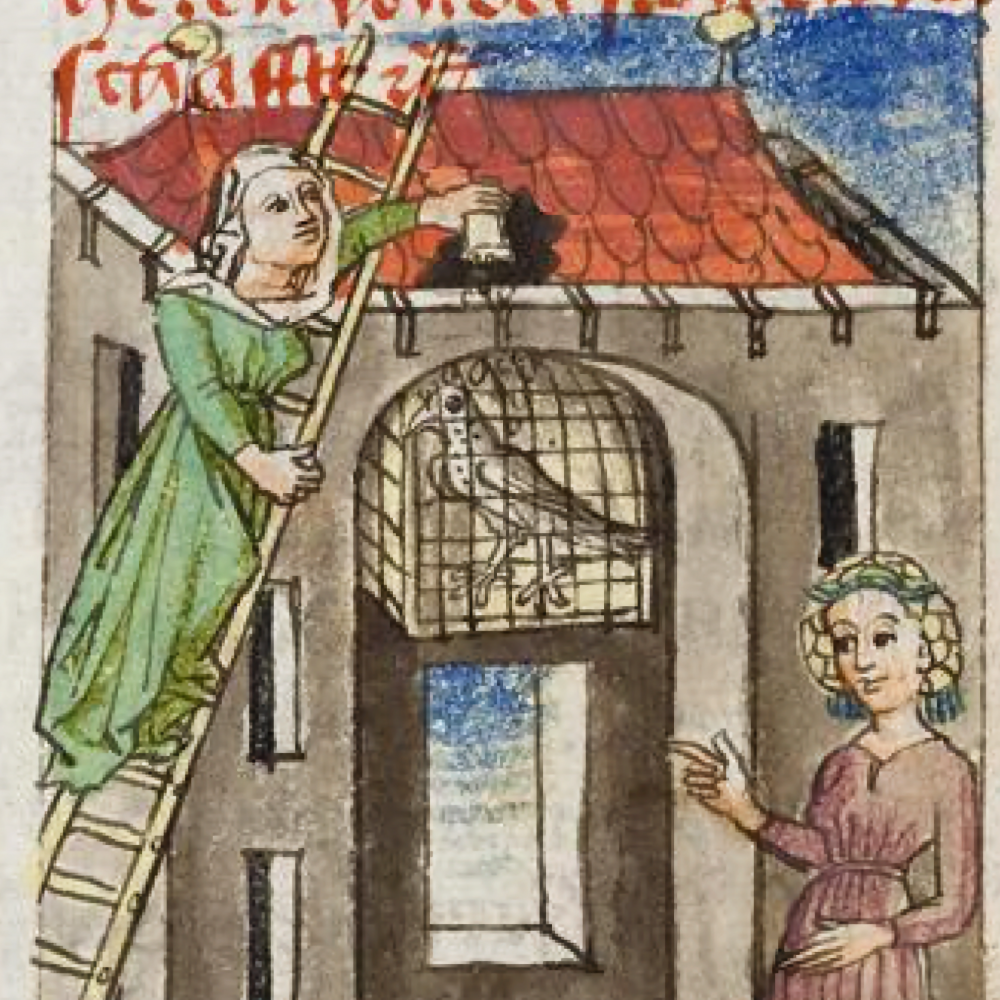
Episode 4: Story Day III (Gaza, Avis) (Click to download)
In this episode, we have a look at the third storytelling day and the two examples of Gaza and Avis. We talk about different versions of the stories, losses due to lore, issues of guilt, and relationship problems. We also discuss different interpretations of both examples, the reliability of the narrators, and take a tentative look at initial developments in the frame story.
Speakers: Theresa Bruckner, Gregor Bühler, Pia Jurczik
Consulted Research Literature
– Lundt, Bea: „Der phaff, der gefellet mir.“ Außereheliche Lust und List von Frauen im 15. Jahrhundert am Beispiel von drei Erzählungen des Hans von Bühel, in: Lustgarten und Dämonenpein. Konzepte von Weiblichkeit in Mittelalter und Früher Neuzeit, hg. von Annette Kuhn und Bea Lundt, Dortmund 1997, S. 285-312.
– Speer, Mary B.: "Translatio as Inventio: Gaston Paris and the ‚Treasure of Rhampsinitus‘ (Gaza) in the Dolopathos Romance", in: Transtextualities. Of Cycles and Cyclicity in Medieval French Literature, hg. von Donald Maddox und Sara Sturm Maddox, Binghamton/New York 1996, S. 125-155.
– Steinmetz, Ralf-Henning: Exempel und Auslegung. Studien zu den „Sieben weisen Meistern“, Freiburg, Schweiz 2000, S. 67-70, 96-100.
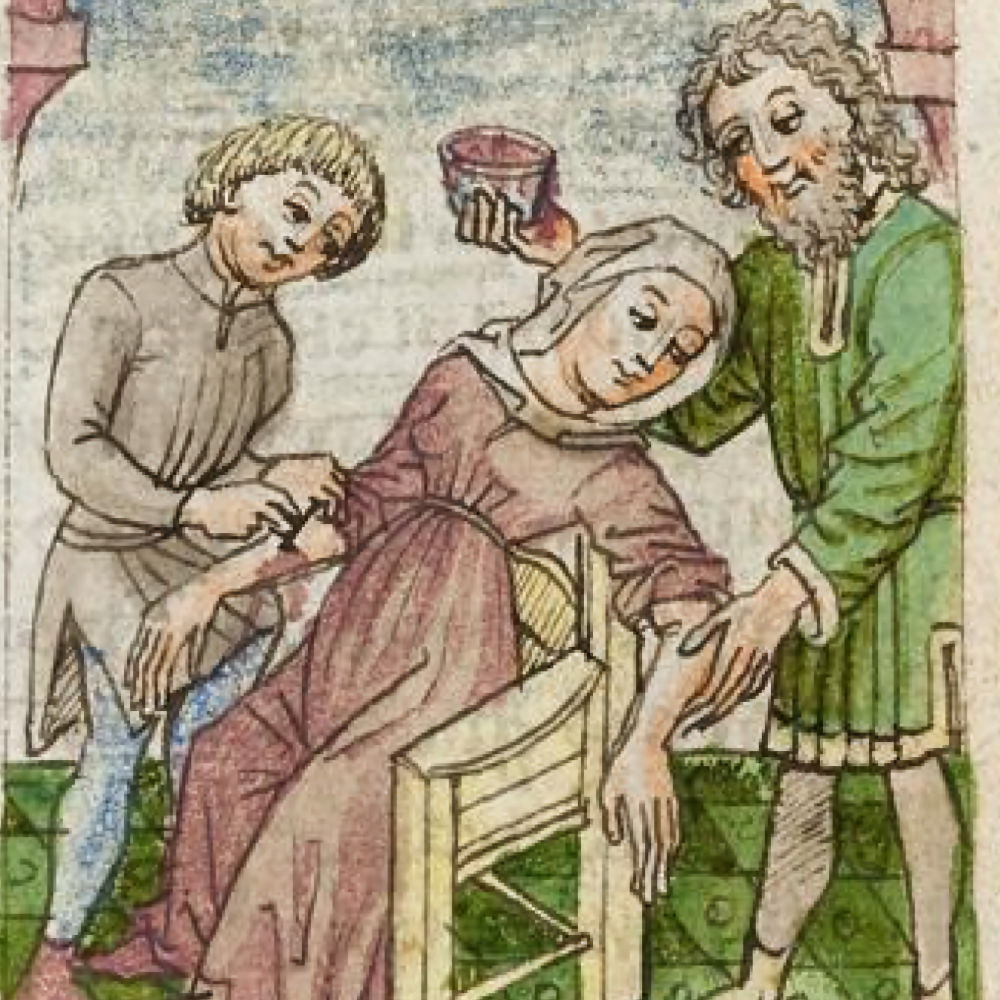
Episode 5: Story Day IV (Sapientes, Tentamina) (Click to download)
This episode focuses on the motif of misogyny, which is a common thread throughout the Seven Sages of Rome, and the distinction between ‘appearance’ (Schein) and ‘being’ (Sein).
Sprecher*innen: Carla Krebs, Felicity Price
Consulted Research Literature
– Campbell, Killis: "The Source of the Story Sapientes in The Seven Sages of Rome", in: Modern Language Notes 23 (1908), S. 202-204.
– Skow-Obenaus, Katya: "Seeing is Believing: Deception as a Narrative Tactic in Die sieben weisen Meister", in: Fifteenth-Century Studies 21 (1994), S. 303-323.
– Skow-Obenaus, Katya: "The Whole is the Sum of Its Parts: Misogyny As a Unifying Factor in Die sieben weisen Meister", in: Fifteenth-Century Studies 26 (2001), S. 169-182.
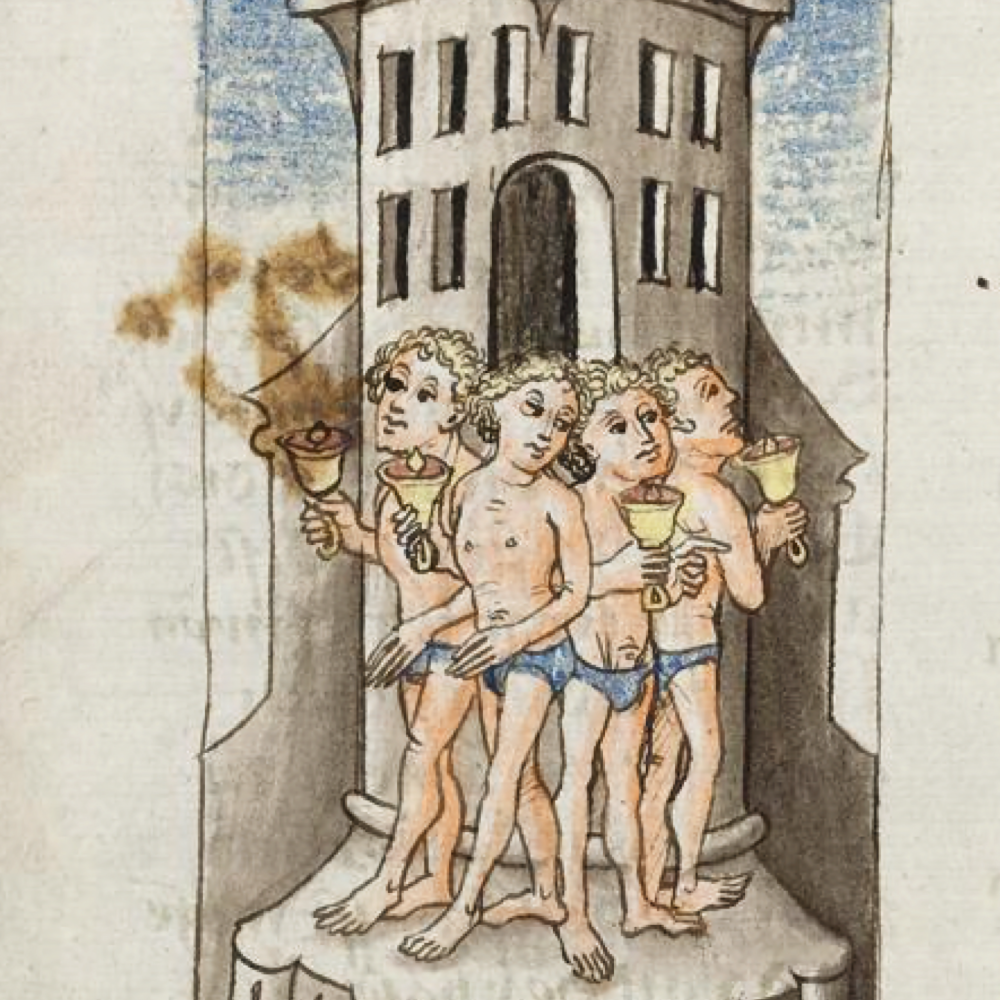
Episode 6: Story day V (Virgilius, Medicus) (Click to download)
This sixth episode is dedicated to the fifth narrative day with the examples of Virgilius and Medicus. The empress delivers her narration and the fifth sage, Josephus, counters - right? Not so really! This day of the story contains a change in pace, both the empress and the sage do their best to win the emperor over.
Speakers: Melina Boll, Adeline Justus, Vanessa Müller, Alexander Ristova
Consulted Research Literature
– Krappe, Alexander Haggerty: "Studies on the Seven Sages of Rome", in: Archivum Romanicum 8 (1924), S. 386-407.
– Krappe, Alexander Haggerty: "Studies on the Seven Sages of Rome", in: Archivum Romanicum 16 (1933), S. 271-282.
– Mallette, Karla: "The Seven Sages of Rome: Narration and Silence", in: D’Orient en Occident. Les receuils de fables enchâssées avant les Mille et une Nuits de Galland (Barlaam et Josaphat, Calila et Dimna, Disciplina clericalis, Roman des Sept Sages), hg. von Marion Uhlig und Yasmina Foehr-Janssens, Turnhout 2014, S. 129-146.
– Steinmetz, Ralf-Henning: Exempel und Auslegung. Studien zu den „Sieben weisen Meistern“, Freiburg, Schweiz 2000, S. 78-80, 103-107.
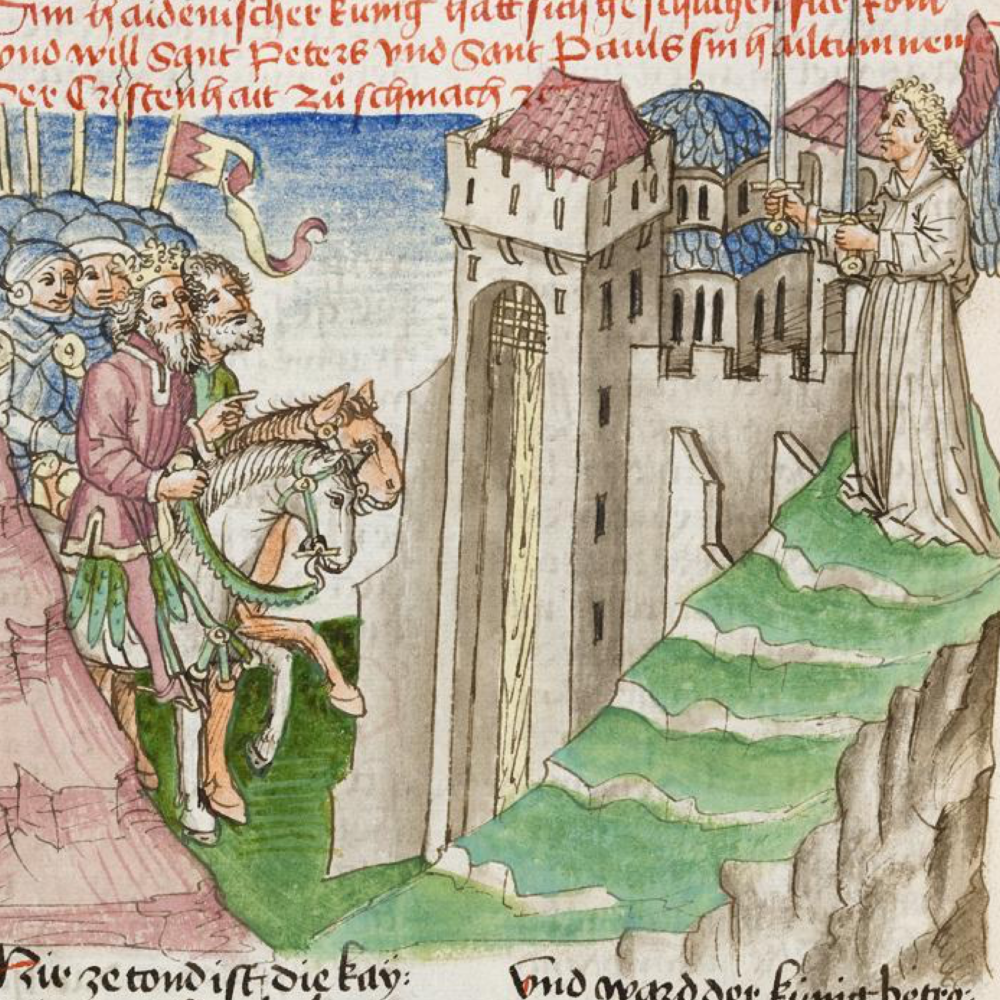
Episode 7: Story Day VI (Senescalcus / Roma, Amatores) (Click to download)
It is day 6 of our lively storytelling round! This time we face the question: What would it look like if the characters of sage, empress and emperor clashed? How effective are the examples of the empress and the sage on this day? And what does a direct exchange of blows between our opponents tell us about their condition and intentions so close to the showdown?
Speakers: Adrian Brenneisen, Bianca Multerer, Saskia Weber
Consulted Research Literature
– Runte, Hans R.: "From the Vernacular to Latin and Back: The Case of The Seven Sages of Rome", in: Medieval Translators and their Craft, hg. Von Jeanette Beer, Kalamazoo 1989, S. 93-133
– Steinmetz, Ralf-Henning: Exempel und Auslegung. Studien zu den „Sieben weisen Meistern“, Freiburg, Schweiz 2000, S. 1-59.
Consulted Research Literature
— Fehling, Detlev: "Die Eingesperrte (‚Inclusa‘) und der verkleidete Jüngling (‚Iuvenis femina‘). Neues zur Traditionsgeschichte zweier antiker Komödienmotive nebst einem Beitrag zur Geschichte des ‚Sindbad‘-Zyklus" in: Mittellateinisches Jahrbuch 21 (1986), S. 186-207.
— Kiening, Christian: "Verletzende Worte – verstümmelte Körper. Zur doppelten Logik spätmittelalterlicher Kurzerzählungen", in: Zeitschrift für deutsche Philologie 127 (2008), S. 321-335.
— Steinmetz, Ralf-Henning: Exempel und Auslegung. Studien zu den „Sieben weisen Meistern“, Freiburg, Schweiz 2000, S. 1-59.
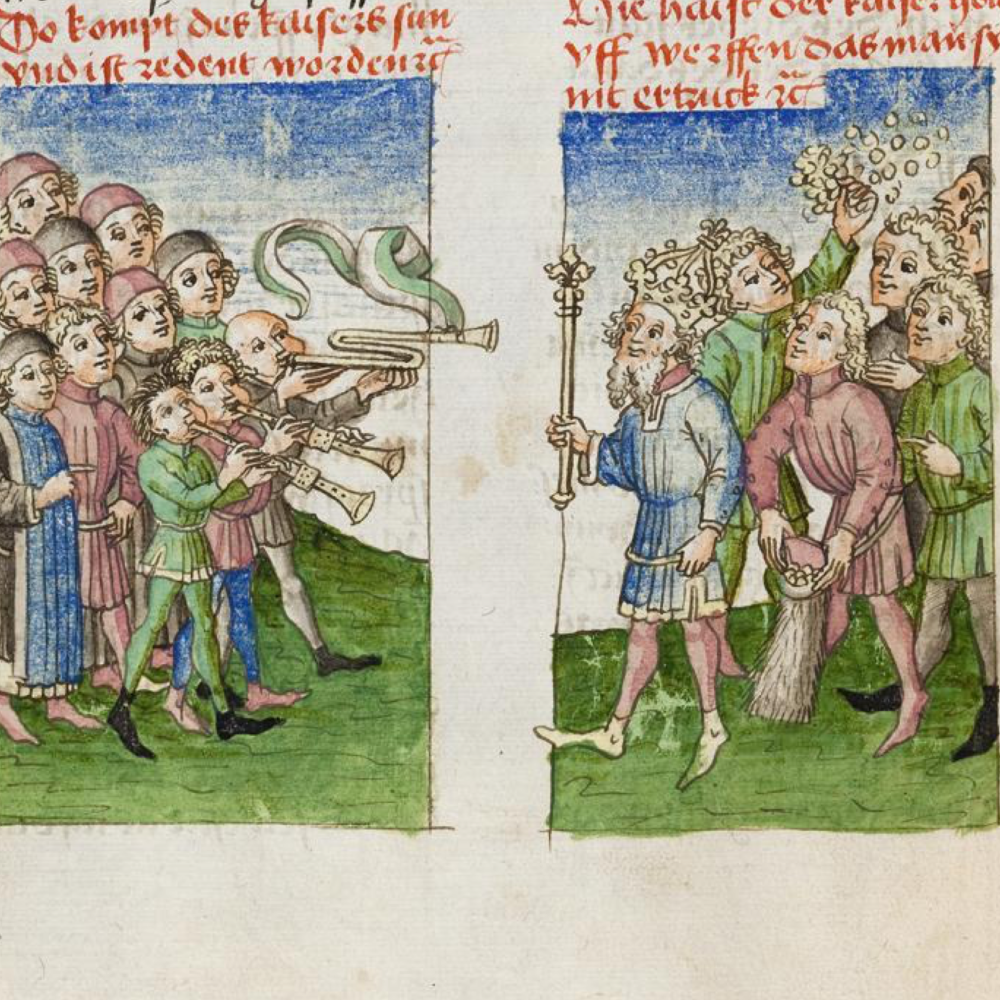
Episode 9: The Finale (Vaticinium / Amici) (Click to download)
Diocletian’s plan has come to fruition: While he was forced to remain silent for seven days, his sages were able to save him from death in a contest with the empress. This installment looks at the finale of the storytelling series, Diocletian as storyteller, and the twisty resolution of the case.
Speakers: Prof. Dr. Bent Gebert, Dr. Nico Kunkel
Consulted Research Literature
– Feistner, Edith: Die Freundschaftserzählungen vom Typ „Amicus und Amelius“, in: Festschrift Herbert Kolb zum 65. Geburtstag, hg. von Klaus Matzel und Hans-Gert Roloff, Bern 1989, S. 97-130.
– Kragl, Florian: Episodisches Erzählen – Erzählen in Episoden. Medientheoretische Überlegungen zur Systematik, Typologie und Historisierung, in: Diegesis 6 (2017), S. 176-197.
– Skow-Obenaus, Katya: Seeing is Believing: Deception as a Narrative Tactic in Die sieben weisen Meister, in: Fifteenth-Century Studies 21 (1994), S. 303-323.
– Steinmetz, Exempel und Auslegung, S. 117-126.
– Winst, Silke: Amicus und Amelius. Kriegerfreundschaft und Gewalt in mittelalterlicher Erzähltradition, Berlin/New York 2009, S. 298-306 u. 361-374.
